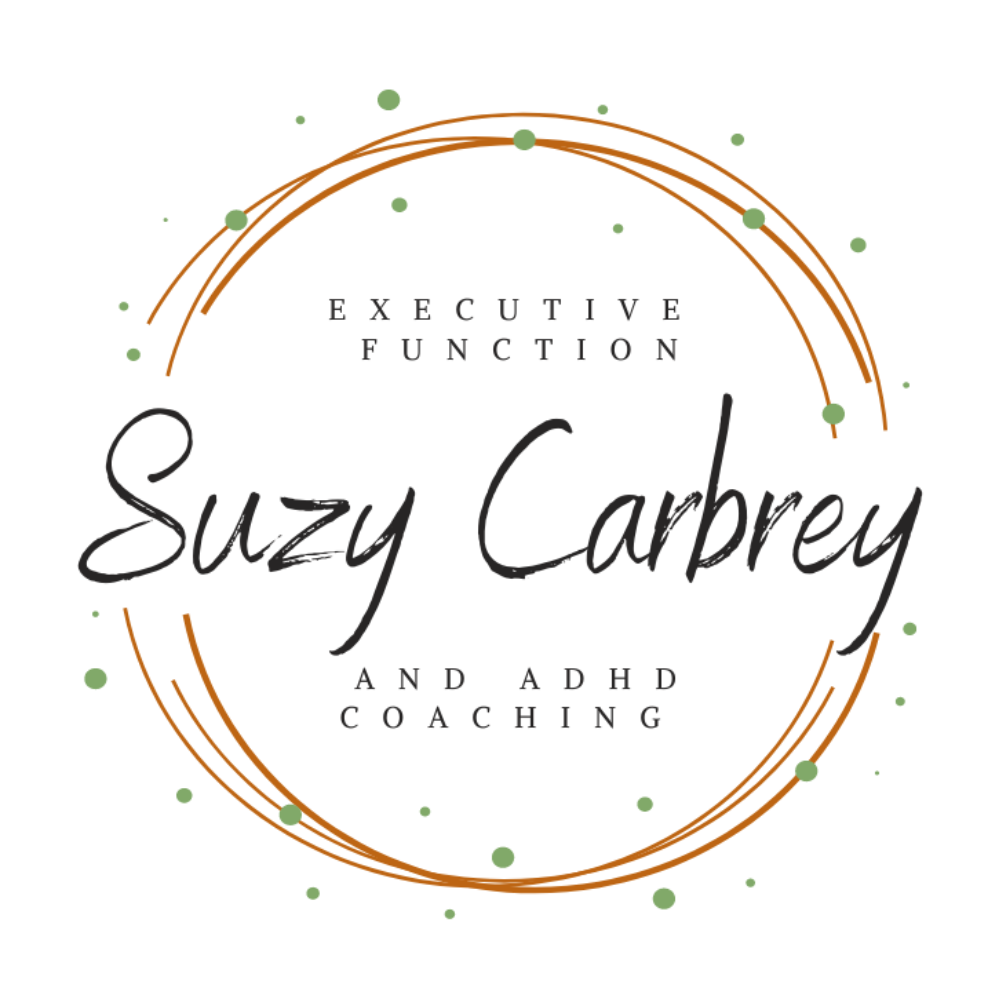 Written by Suzy Carbrey ⧫
Written by Suzy Carbrey ⧫
Unlocking Productivity: Top ADHD Strategies for Real-Life Success
Let’s explore some powerful strategies that align the connection between your brain and body, amplifying cognitive processes and fortifying your executive functioning skills. Executive functioning skills are the thinking skills that enable us to plan, organize, prioritize, manage our time, and regulate our behavior effectively. It plays a crucial role in our ability to accomplish tasks, make decisions, and navigate complex social interactions.
Patience and consistency are the keys as we dive into this holistic approach, aiming to unlock your full potential and excel in planning, decision-making, and handling complex tasks with greater success. In this article, learn 12 potent ADHD strategies to pave the way to a productive life filled with focus and accomplishment.
Strategy 1: Prioritize Quality Sleep
Sleep Smarter, Work Better: Unleashing Productivity With ADHD Through Quality Rest
To unlock focus and enhance productivity, it’s important to make sleep a priority. By establishing consistent sleep routines and creating a peaceful sleep environment, you can improve task initiation, follow-through, and social engagement. Minimize distractions and try relaxation techniques before bedtime to promote restful sleep. Quality sleep rejuvenates your body and mind, enhancing cognitive processes and boosting executive functioning. When you prioritize self-care and develop healthy sleep habits, you’ll find it easier to regulate emotions, maintain focus, and engage effectively in social interactions. Remember, quality sleep is a key component of your strategy for improved productivity in various areas of your life.
Strategy 2: Foster Positive Social Interactions
The Power of Connection: Boosting ADHD Productivity through Positive Social Interactions
Unlocking focus and achieving a productive life involves encouraging open communication and practicing active listening without judgment. It’s important to set clear boundaries and expectations that promote respect and cooperation in your interactions. By being reliable and fostering positive relationships, you can build trust among peers. Additionally, providing emotional support and resources for well-being creates a secure environment where individuals can freely express themselves. Encourage personal growth and independence, allowing everyone to make positive changes in their responses and behaviors. Creating such an environment promotes focus, enhances productivity, and nurtures personal development.
Strategy 3: Implement Habits and Routines
Harnessing the Power of Routines: ADHD-Optimized Habits for Enhanced Productivity
To unlock focus and support overall well-being, it’s beneficial to establish structured routines and habits in a flexible and easy manner. Routines and habits help reduce decision-making, allowing you to focus your energy more effectively. Begin by identifying key activities or tasks you want to include in your routine. Create a general framework for your day, including designated times for waking up, meals, work or study, relaxation, and sleep. However, it’s important to remain flexible and adaptable to unexpected events. Aim for a loose structure that guides your day while being open to adjustments. Gradually introduce new habits and integrate them into your routine to make them more manageable. Remember to be kind to yourself and prioritize self-care and relaxation. By implementing habits and routines in an easy and flexible way, you create a supportive environment that promotes a calm and engaged state of mind, ultimately enhancing your focus and productivity.
Strategy 4: Engage in Regular Physical Activity
From Fidget to Focus: Channeling ADHD Energy with Exercise for Optimal Productivity
Regular exercise not only benefits your physical health but also supports your ability to initiate tasks, follow through with them, and engage in social interactions. When you exercise, your brain releases feel-good chemicals that reduce stress and improve your mood. It also enhances cognitive function, including important executive functioning skills like planning and organization. By incorporating exercise into your routine, you can strengthen your ability to effectively manage tasks and maintain focus. Moreover, the practice provides opportunities for social engagement, such as joining group activities or exercising with friends, which further enhances your social connections and feelings of safety and belonging. By prioritizing regular exercise, you can positively impact both your productivity and your ability to interact with others in social settings.
Strategy 5: Practice Deep Breathing 
Breathe, Focus, Excel: Enhancing ADHD Concentration with Powerful Breathing Exercises
Deep breathing exercises can help activate a state of focus and engagement by promoting relaxation. When we engage in deep, slow breaths, it signals to our brain that we are safe and shifts us from a state of stress to a calm and connected state. Deep breathing increases oxygen flow, slows the heart rate, and reduces muscle tension, all contributing to a sense of relaxation and openness. By regularly practicing deep breathing exercises, we create a safe and supportive environment for our nervous system, enabling better focus and connections with others. Deep breathing is a powerful tool for unlocking productivity and enhancing positive social interactions.
Strategy 6: Check in with Your Sensory Experiences
Sensory Superpowers: Cultivating ADHD Focus Through Improved Sensory Awareness
Paying attention to our senses helps us connect with others and fully engage in life. When we focus on what we see, hear, smell, taste, and touch in our surroundings, we become more present in the moment and less preoccupied with our thoughts. This presence allows us to genuinely listen and show interest in what others are saying and what we are doing, leading to better focus. By being aware of subtle cues in people’s expressions and body language, we gain a better understanding of them and can respond with empathy. Moreover, attending to sensory experiences brings us joy and pleasant feelings, making experiences more enjoyable. By consciously engaging our senses, we enhance our social engagement and create more meaningful progress in life.
Strategy 7: Try Mindfulness to Enhance Self-Awareness and Focus
Mindfulness Matters: Cultivating ADHD Focus Through the Power of Present-Moment Awareness
Mindfulness is a powerful tool that can help us improve our productivity. Mindfulness is the practice of being fully present and aware of the present moment without judgment. By focusing on the present moment and becoming more aware of our thoughts and feelings, we can manage stress, make better decisions, and be more creative. This can lead to increased focus and concentration, which can help us get more done in less time. Mindfulness can also help us to be more present and engaged in social interactions, which can lead to stronger relationships. If you are looking for ways to improve your productivity, mindfulness is a great place to start.
Strategy 8: Manage Your Stress
From Overwhelm to Accomplishment: Stress Management Strategies for ADHD Productivity
Stress can have a number of negative effects on our cognitive function, including reduced focus and concentration, poor decision-making, and difficulties in social interactions. These effects can make it difficult to be productive and can lead to problems in our personal and professional lives. There are a number of things we can do to manage stress, such as identifying our stressors, taking breaks, engaging in relaxation activities, getting enough sleep, and talking to someone we trust. By taking steps to manage stress, we can improve our focus, concentration, and social interactions, which can lead to improved productivity and overall well-being.
 Strategy 9: Establish Self-Regulation Techniques
Strategy 9: Establish Self-Regulation Techniques
Mastering Self-Regulation: Unlocking Success with ADHD
Self-regulation refers to the ability to manage and control one’s thoughts, emotions, and behaviors in order to adapt to different situations and achieve desired outcomes. It involves being aware of and monitoring one’s internal experiences, such as emotions and impulses, and using strategies to guide and modulate them effectively. Self-regulation encompasses skills like impulse control, emotional regulation, attention control, and goal-directed behavior. It allows individuals to make thoughtful decisions, regulate their actions, and maintain focus and self-control in various aspects of life. People with ADHD can improve their self-regulation by setting realistic goals, creating a routine, using tools and strategies, being patient and persistent, and finding a support system. There is no one-size-fits-all approach to self-regulation, so it is important to find what works for you and be flexible. If you are struggling to improve your self-regulation, don’t be afraid to ask for help. With effort and persistence, people with ADHD can master self-regulation and unlock their productivity.
Strategy 10: Create a Sense of Safety and Trust in Your Environment
Setting the Stage for Success: Optimizing Productivity through an ADHD-Friendly Environment
People with ADHD can optimize their productivity by creating a predictable physical environment. This can be done by organizing and minimizing distractions, keeping the space clean, well-lit, and free from potential hazards, establishing routines and systems, making the environment comfortable, and using visual cues. By following these steps, people with ADHD can create a space that promotes a feeling of safety and trust, contributing to overall well-being and positive interactions. Here are some other things to try: use noise-canceling headphones or earplugs to block out distractions, set up your workspace in a quiet and comfortable area, work in short bursts of time with breaks in between, take breaks to move around and stretch, use a timer or app to help you stay on task, and reward yourself for staying on task.
Strategy 11: Break Projects Down into Steps
Stepping Stones to Success: Breaking Down ADHD Challenges into Manageable Steps
Breaking down tasks can help us focus better and stay on track. It also helps us feel less stressed and overwhelmed. If we have a big task to do, we can break it down into smaller steps. This will make it seem less daunting and help us feel a sense of accomplishment as we complete each step. We can also imagine that we are a detective and we have to solve a mystery. We would probably break the mystery down into smaller clues. Then, we would start investigating each clue one at a time. This is the same way we should break down big tasks. We should break them down into smaller steps and then start working on each step one at a time.
Strategy 12: Use Visual Cues, Reminders, and External Expectations 
Building a Strong Support System: Harnessing External Resources for ADHD Success
Visual cues, reminders, and external expectations can help us stay focused and organized. Visual cues, like sticky notes or post-its, can help us remember what we need to do. Reminders, like alarms or timers, can also help us stay on track. External expectations, like telling a friend or family member what we’re working on, can also help us stay motivated. For example, we can write down important tasks or reminders on sticky notes and place them in places where we’ll see them often. We can also set alarms or timers to remind us of important tasks or deadlines. And we can tell a friend or family member what we’re working on, so they can check in with us and hold us accountable. Using these techniques can help us stay focused and organized, which can lead to less stress, better productivity, and more positive overall well-being.
Try These Strategies to Unlock Productivity and Achieve Real-Life Success
By integrating these strategies into our daily routines and interventions, you can support your executive functioning skills, leading to improved decision-making, productivity, and overall well-being. You can enhance your executive functioning skills and thrive in various aspects of your life. Remember to approach this journey with patience and consistency, and prioritize self-care and well-being along the way.
Begin Online Coaching for Executive Functioning / ADHD
Ready to gain control and enhance your executive functioning? As an experienced and compassionate coach, I specialize in providing support for executive functioning and ADHD. To embark on your journey, please reach out to me at 708-264-2899 or email hello@suzycarbrey.com to schedule a FREE 20-minute discovery call consultation.
With a background as a speech-language pathologist, I have a strong foundation in executive functioning coaching. My graduate degree program in SLP placed a significant emphasis on cognition, including executive functions, and I have years of experience in medical rehabilitation, providing cognitive-communication therapy. Additionally, I have completed an ADHD Services Provider certification program, I am Solutions-Focused Brief Therapy Diamond Level 1 certified and I am trained in the Seeing My Time® executive functioning curriculum.
Experience the convenience and effectiveness of online coaching, backed by studies that demonstrate equal results to in-person services. Parents, professionals, and emerging adults love the convenience and privacy of receiving coaching from their own homes.
Whether you reside in Chicago, Milwaukee, Indianapolis, Kansas City, or anywhere else around the globe, I am here to assist you. Schedule your discovery call consultation today, and I eagerly anticipate the opportunity to work with you!
Please note that although I am a certified speech-language pathologist, all services Suzy Carbrey LLC provides are strictly coaching and do not involve clinical evaluation or treatment services. If you require a formal speech therapy evaluation and treatment, please inform me, and I can provide appropriate recommendations.

